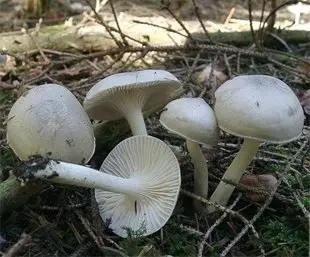Fragrant Hygrophorus (Hygrophorus agathosmus)
- Division: Basidiomycota (Basidiomycetes)
- Subdivision: Agaricomycotina (Agaricomycetes)
- Class: Agaricomycetes (Agaricomycetes)
- Subclass: Agaricomycetidae (Agaricomycetes)
- Order: Agaricales (Agaric or Lamellar)
- Family: Hygrophoraceae (Hygrophoraceae)
- Genus: Hygrophorus
- Type: Hygrophorus agathosmus (Hygrophorus fragrant)
- fragrant hygrophorus

Hat: The cap diameter is 3-7 cm. At first, the cap has a convex shape, then it becomes flat with a protruding tubercle in the center. The skin of the cap is slimy, smooth. The surface has a greyish, olive gray or yellow-gray color. Along the edges of the hat is a lighter shade. The edges of the cap remain concave inward for a long time.
Records: soft, thick, infrequent, sometimes forked. At a young age, the plates are adherent, then they become descending. In young mushrooms, the plates are white, then become dirty gray.
Leg: The height of the stem is up to 7 cm. The diameter is up to 1 cm. The cylindrical stem thickens at the base, sometimes flattened. The leg has a grayish or grayish-brown color. The surface of the leg is covered with small, flake-like scales.
Pulp: soft, white. In rainy weather, the flesh becomes loose and watery. It has a distinct almond smell and a sweet taste. In rainy weather, a group of mushrooms spreads such a strong smell that it can be felt several meters from the place of growth.
Spore Powder: white.
Fragrant hygrophorus (higrophorus agathosmus) is found in mossy, damp places, in spruce forests. Prefers mountainous areas. Fruiting time: summer-autumn.
The fungus is practically unknown. It is eaten salted, pickled and fresh.
Fragrant hygrophorus (higrophorus agathosmus) differs from other species in its strong almond odor. There is a similar mushroom, but its smell is more like caramel, and this species grows in deciduous forests.
The name of the mushroom contains the word agathosmus, which translates as “Fragrant”.









